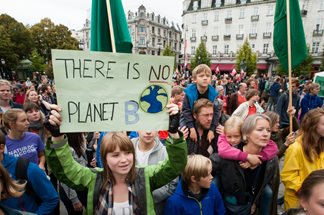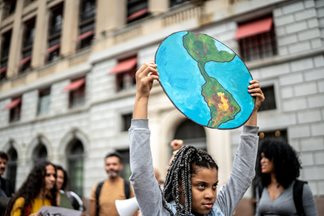5 Key Things to Know About Kids and Climate Change
Many adults are anxious and concerned about the potential impacts of climate change – and many kids are too. Younger adults are more likely to be concerned that older adults, according to a recent APA poll, specifically More than half (57%) of young adults (18-34 years) feel climate change is already impacting the mental health of Americans compared to 41% of those 65 and older. Just over half (51%) of 18–34-year-olds are anxious about the impact of climate change on their own mental health compared to 24% of adults 65 and older. In addition, about half of adults are somewhat or very anxious about the impact of climate change on future generations.

Other research shows that teens and children are well aware of climate change issues and are concerned or worried about the impacts. To help us understand the impacts on kids, their perspectives and ways to respond positively, the members of the American Psychiatric Associations’ Committee on Climate Change and Mental health, chaired by Elizabeth Haase, M.D., offer five key things to know about kids and climate change.
- Kids are upset about climate change – really upset.
In a recent global study, 68% of young people reported that they feel sad and afraid of climate change. A majority of kids also feel angry and powerless, and almost a third of them rate their climate worry as “extreme.” (Hickman et al 2021)
- For some kids, it can become more than a normal worried response.
Most often, the distress kids feel about climate change is a normal response to a frightening situation beyond their control, but climate change worry can also show up as obsessive-compulsive disorder, suicidal thinking, or post-traumatic stress symptoms after a natural disaster.
- Climate change can stress kids out in multiple ways.
Climate change also places stress on children through other mechanisms, both biological and environmental. High temperatures, air pollution, and food and water shortages from climate change can lead to more poverty and hardship, more parental stress and domestic violence, and more violence and conflict in communities that contribute to ill health in parents and children.

- Kids’ perspectives vary by developmental stage.
Kids are not just little adults. Psychologically, they understand things through the lens of their developmental stage at the time, whether the egocentric “It’s because of me” of the small child or the “adults are irrelevant” of the teen. Modeling adult environmental stewardship and helping them see and appreciate the diversity of people and groups working on climate change can help.
- Kids need straight realistic talk about climate change.
Putting all this together, kids need straight realistic talk about climate change that does not play up imminent planetary doom or minimize the real dangers we face. Talking about the disavowal in our lifestyle – the difference between how we live versus how we need and want to live to help the environment - can lower the anxiety kids feel about “we are not doing it right!” It can also create space for effective action on climate, and more important, model how to go about the process of looking at oneself and making needed change in general – a practice that helps all aspects of mental health.
References
Hickman, C., Marks, E., Pihkala, P., Clayton, S., Lewandowski, R. E., Mayall, E. E., Wray, B., Mellor, C., & van Susteren, L. (2021). Climate anxiety in children and young people and their beliefs about government responses to climate change: a global survey. The Lancet. Planetary health, 5(12), e863–e873. https://doi.org/10.1016/S2542-5196(21)00278-3
